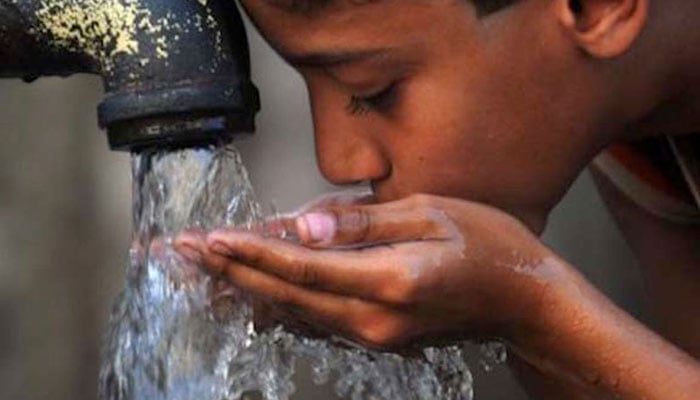Naegleria fowleri patient battling for life at hospital
People in Karachi are in the grip of deadly infectious diseases at the moment as officials in Karachi said Friday that a 34-year old man was infected with the lethal Naegleria fowleri amoeba or the brain-eating bug and was struggling for life at a private hospital in the city.
Naegleria fowleri is a single-celled organism that can cause a rare infection of the brain called “primary amoebic meningoencephalitis”, also known as PAM, which is usually fatal, officials said adding that it thrives in warm temperatures and is commonly found in warm bodies of fresh water, such as lakes, rivers and hot springs, though it can also be present in soil.
“It enters the body through the nose, and it moves on to the brain. Infection typically occurs when people go swimming in lakes and rivers or people put water in the nose while making ablution,” said Dr Zafar Mehdi, focal person for the Sindh health department’s Naegleria fowleri monitoring committee.
Health department officials said Shoaib Ahmed Siddiqui, a resident of the Liaquatabad area, started having a headache and a low-grade fever a couple of days back and, despite taking medicine, his condition deteriorated. He was taken to the emergency of Aga Khan Hospital on Thursday where he was put on life support after his condition worsened and lab tests confirmed he was infected with Naegleria fowleri.
Health experts said the amoeba got its nickname because it starts to destroy brain tissue once it reaches the brain, after it is forced up there in a rush of water. The bug has so far claimed two lives in Karachi this year.
“Two persons including a young student who was identified as Anas Aslam and a 44-year old man Rasheed Shah have succumbed to the lethal amoebic infection in Karachi this year so far,” an official of the health department said, adding that Siddiqui was the third confirmed case.
Several people had died due to lethal infectious diseases in Karachi, including Congo Crimean Hemorrhagic Fever, dengue fever and Naegleria fowleri, officials said, adding that in addition to deaths, viral infections like polio were also crippling children in Karachi.
As far as the Naegleria fowleri infection is concerned, a recent study conducted by experts in Karachi and Saudi Arabia has revealed that Naegleria fowleri’s colonies are present in the mud accumulated in the overhead and underground tanks of water in Karachi and as soon as weather conditions become favourable, they start growing and multiplying in huge numbers.
According to Dr Zafar Mehdi, seven persons had lost their lives due to the lethal infection caused by the brain-eating bug in the city in 2018 as the Karachi Water and Sewerage Board have been providing non-chlorinated water to the citizens for the last several years. “Chlorination of water kills all the microorganisms, but unfortunately, our water utility is not adding chlorine to the water,” Dr Mehdi said.
-
 Worst Cricket Moments That Shocked The Game
Worst Cricket Moments That Shocked The Game -
 Prince Harry, Meghan Markle Reach A Crossroads: ‘You Could Lose Everything’
Prince Harry, Meghan Markle Reach A Crossroads: ‘You Could Lose Everything’ -
 F1 Title Race: Who Will Win 2026 Drivers’ And Constructors’ Championships?
F1 Title Race: Who Will Win 2026 Drivers’ And Constructors’ Championships? -
 New Observatory Sends 800,000 Asteroid Alerts In One Night
New Observatory Sends 800,000 Asteroid Alerts In One Night -
 Cher’s Son Elijah Blue Allman Apprehended On Two Counts Of Assault At Elite Prep School
Cher’s Son Elijah Blue Allman Apprehended On Two Counts Of Assault At Elite Prep School -
 Beatrice, Eugenie Now Face Andrew, Sarah's ‘nightmares’: 'They're Hugely Conflicted'
Beatrice, Eugenie Now Face Andrew, Sarah's ‘nightmares’: 'They're Hugely Conflicted' -
 X Debuts Topic Filtering To Help Users Shape Their ‘For You’ Recommendations
X Debuts Topic Filtering To Help Users Shape Their ‘For You’ Recommendations -
 Scientists Built World's First Computer That Learns Like Human Brain
Scientists Built World's First Computer That Learns Like Human Brain -
 Robert Carradine’s Daughter Makes Bombshell Confession As Actor's Death Cause Confirmed
Robert Carradine’s Daughter Makes Bombshell Confession As Actor's Death Cause Confirmed -
 Beatrice, Eugenie Put On Blast: ‘Only Nitwits Wouldn’t See An Association With A Pedophile As Toxic’
Beatrice, Eugenie Put On Blast: ‘Only Nitwits Wouldn’t See An Association With A Pedophile As Toxic’ -
 OpenAI Defies Industry Pressure, Secures Guardrails Under New US Defense Department Pact
OpenAI Defies Industry Pressure, Secures Guardrails Under New US Defense Department Pact -
 'Sinners' Delroy Lindo Breaks Silence On BAFTA's Tourette’s Incident At NAACP Image Awards
'Sinners' Delroy Lindo Breaks Silence On BAFTA's Tourette’s Incident At NAACP Image Awards -
 Billy Joel Admits Cancelling Of Tour Due To Brain Disorder 'sounds A Lot Worse' Than It Is
Billy Joel Admits Cancelling Of Tour Due To Brain Disorder 'sounds A Lot Worse' Than It Is -
 US And Israeli Strikes On Iran: Everything You Need To Know
US And Israeli Strikes On Iran: Everything You Need To Know -
 US Strikes On Iran Ignite Emergency Push For Powers Legislation: Report
US Strikes On Iran Ignite Emergency Push For Powers Legislation: Report -
 Kelly Osbourne's Mom Sharon Receives 'shut Up' Call Accepting An Award For Late Hubby?
Kelly Osbourne's Mom Sharon Receives 'shut Up' Call Accepting An Award For Late Hubby?




